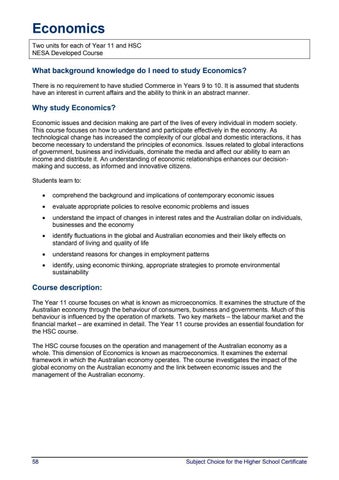Economics Two units for each of Year 11 and HSC NESA Developed Course
What background knowledge do I need to study Economics? There is no requirement to have studied Commerce in Years 9 to 10. It is assumed that students have an interest in current affairs and the ability to think in an abstract manner.
Why study Economics? Economic issues and decision making are part of the lives of every individual in modern society. This course focuses on how to understand and participate effectively in the economy. As technological change has increased the complexity of our global and domestic interactions, it has become necessary to understand the principles of economics. Issues related to global interactions of government, business and individuals, dominate the media and affect our ability to earn an income and distribute it. An understanding of economic relationships enhances our decisionmaking and success, as informed and innovative citizens. Students learn to: •
comprehend the background and implications of contemporary economic issues
•
evaluate appropriate policies to resolve economic problems and issues
•
understand the impact of changes in interest rates and the Australian dollar on individuals, businesses and the economy
•
identify fluctuations in the global and Australian economies and their likely effects on standard of living and quality of life
•
understand reasons for changes in employment patterns
•
identify, using economic thinking, appropriate strategies to promote environmental sustainability
Course description: The Year 11 course focuses on what is known as microeconomics. It examines the structure of the Australian economy through the behaviour of consumers, business and governments. Much of this behaviour is influenced by the operation of markets. Two key markets – the labour market and the financial market – are examined in detail. The Year 11 course provides an essential foundation for the HSC course. The HSC course focuses on the operation and management of the Australian economy as a whole. This dimension of Economics is known as macroeconomics. It examines the external framework in which the Australian economy operates. The course investigates the impact of the global economy on the Australian economy and the link between economic issues and the management of the Australian economy.
58
Subject Choice for the Higher School Certificate




